Blues
Reviews
August/September 2019
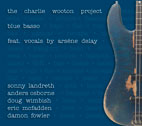 Charlie
Wooton Project
Charlie
Wooton Project
Blue Basso
Wild Heart Records www.charliewooton.com
Charlie Wooton has been the bandleader/bassist for the acclaimed band
Zydefunk, which he formed in Atlanta to reflect the music of his home
state of Louisiana. Since moving back to Louisiana he has assembled the
Charlie Wooton Project which includes Daniel Groover on guitar, Jermal
Watson on drums and keyboardist Keiko Komaki. “Blue Basso,”
their second release, includes eight originals by Charlie and various
band members and two covers. Seven songs feature singer Arséne
Delay, the other three tracks are instrumentals. The funky instrumental
“Jaceaux” (a French version of the name Jaco?) sets the table
with a nice organ solo by Komaki and a cameo by Living Colour bassist
Doug Wimbish. “I Don’t Know” is driven by Wooton’s
walking basslines as Delay sings over some nice chord changes and features
some lap steel by guest Damon Fowler and a rare bass solo (for a bass
player’s album!) by Wooton. “Come On Come Over” is a
cover from Jaco Pastorius’ monumental solo debut which was originally
sung by Sam & Dave. On “Dimenote”, written by Daniel Groover,
the guitarist plays bebop-informed lines perhaps influenced by John Scofield
or Mike Stern. Groover’s excellent solo concludes with an epic dive
bomb on the whammy bar. “Tell Me A Story” and “Front
Porch” showcases guest slide guitar giant Sonny Landreth. Landreth’s
sinewy tone and distinctive technique is always a joy to hear and this
is no exception. The aptly named “Front Porch” is a down-home
instrumental highlighting Landreth’s skill on the dobro. The album
closes with a slight reworking of the Rolling Stones classic, “Miss
You.” “Blue Basso” should please fans of blues, jazz
fusion, funk and well, just lovers of good music. These guys have chops
galore in a lot of different styles. Drummer Jermal Watson is a force
throughout and a few of the tracks on the album begin with his powerful
grooves. All in all, a real satisfying listen! – Bob Monteleone
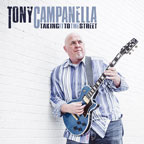 Tony
Campanella
Tony
Campanella
Taking It To The Street
Gulf Coast Records www.tonycampanella.com
Guitarist/singer Tony Campanella has been playing fiery rockin’
blues for 30 years around the St. Louis music scene. After putting his
career on the back burner while raising his family he is finally stepping
out as a recording artist with this excellent debut album, Taking It to
the Street. Produced by guitarist extraordinaire Mike Zito, who lends
his talents to the proceedings, the album contains four Campanella and
three Zito originals to go with four covers, including two Sonny Boy Williamson
tunes. Campanella is expertly supported throughout by Terry Dry on bass,
Matt Johnson on drums, Lewis Stephens on keys along with Zito on rhythm
and slide guitar.
The Zito-penned title cut kicks off the jams with a riff similar to the
Rolling Stones’ treatment of Robert Johnson’s “Stop
Breaking Down” from Exile On Main Street. Tony’s solo explodes
while the band stays on the dominant V chord, creating a deliciously dangerous
tension that resolves back to the nasty opening riff. Campanella’s
“Pack It Up” follows with a powerful Leslie-effected guitar
figure reminiscent of Stevie Ray Vaughan’s “Cold Shot.”
The Sonny Boy Williamson classic “Good Morning Little School Girl”
borrows (alright, steals!) Jimi’s main riff from the Band of Gypsies’
“Who Knows.” Campanella delivers a great vocal on the humorous
Cleanhead Vinson song “Mr. Cleanhead.”
At almost seven minutes long, “Texas Chainsaw,” a Guy Hale/Mike
Zito composition, is a definite highlight. It’s a haunting tour
de force pitting Campanella’s heavy guitar against Zito’s
demonic slide. “Those Are the Times” closes the set, an introspective
Campanella original based on a classy standard chord progression.
This is electric blues to the fullest extent, not an acoustic guitar in
sight. The band rocks the muscular grooves present on every track. Campanella’s
honest vocals and thick guitar tone are a joy from the first to the very
last track. A long overdue debut, let’s hope to hear more from Tony
Campanella in the near future! – Bob Monteleone
 Diana
Rein
Diana
Rein
Queen Of My Castle
Gulf Coast Records www.dianarein.com
Queen Of My Castle is Diana Rein’s first release on the esteemed
blues label Gulf Coast Records, following 2016’s self-produced Long
Road. The album contains 15 Diana Rein originals produced by Walter Trout
drummer Michael Leasure (who also handles the drum chair) with Dave Osti
on bass and Drake Munkihaid Shining on keys. Rein plays lead and rhythm
guitar throughout.
Diana and her parents escaped Communist Romania when she was 3 years old,
settling in and growing up in Chicago. Her first gig was at 8-years old,
sitting in with her uncle’s band at Chicago’s Back Room Blues
club and she hasn’t looked back since. Settling on the West Coast,
she has become a fixture on the California music circuit.
The autobiographical “Yes I Sing the Blues” starts things
off. The verses feature a nice triplet feel settling into a shuffle which
she ably solos over. “The Midnight Line” follows, rocking
an eighth note feel which Rein punctuates with some backing slide. Suddenly
the tune shifts to a slow shuffle, very effective. In the title track,
a shuffle, Rein declares she’s “the queen of the castle, and
you’ll never be king.” Also, the hilarious but biting line
“I’m like the life of the party, you’re like a towel
in the room.” Don’t let Diana’s sweet vocals fool you,
the lyrics reveal a proud and tough woman who doesn’t take lightly
to being spurned. For example, on the rollicking “It’s You,”
there’s this stinger, “I’ve got a secret for you, somebody’s
been knocking on my door, too.” Rein’s vocals contrast nicely
with her down and dirty guitar work. Her soloing shows a great command
of the modern blues vocabulary: fat, nasty tone with little special effects
or frills. I was a little surprised there wasn’t a second guitarist
listed supplying rhythm. But that’s Rein playing those flowing minor
chords on “My Love” and aggressive chording on “Pure
Soul.” She’s doubling the bass line on “Yes I Sing the
Blues” and doing some solid riffing throughout “One Foot In.”
The album’s promo refers to a tribute to Stevie Ray Vaughan but
coyly doesn’t name which track. One’s first guess perusing
through the song titles would be “Time’s Ticking Away,”
perhaps an ode inspired by “Tick Tock” from Stevie Ray and
Jimmie Vaughan’s Family Style. On further listening I’m thinking
it’s the beautiful instrumental that closes the set, “Zoe.”
It’s reminiscent of SRV’s classics “Lenny” and
“Riviera Paradise,” with Diana’s subtle touch - a clean
but fat Stratocaster tone.
All in all, Queen Of The Castle is a compelling listen. The band is solid
throughout the album and lends strong support from the first track to
the last but there’s no doubt who is the queen of THIS castle! –
Bob Monteleone\
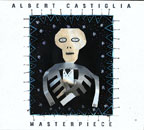 Albert
Castiglia
Albert
Castiglia
Masterpiece
Gulf Coast Records 2019
Multi-talented Miami-based Albert Castiglia has experience as guitarist
for the late harmonica icon Junior Wells, and the creative fire to capitalize
on it. As well as maintaining a steady tour schedule, he has released
over a half dozen albums in the last decade. The last two, both well received,
were “Big Dog” in 2016 and “Up All Night” the
following year. Both were produced by his guitarslinger cohort, Mike Zito.
“Masterpiece” continues that fruitful partnership, this time
on Zito’s own record label, and with Castiglia and Zito abandoning
a band format and handling all the instrumentation themselves.
The result is eleven fiery tunes, all but two composed by Castiglia himself
or with Zito. The title track and album title should not be construed
as braggadocio; instead, they refer to a daughter that Albert didn’t
know he had until she tracked him down. His website reveals that he considers
her to be his masterpiece. The song’s lyrics are poignant: “I
loved you before I ever knew/I wish I could have been around for you.”
Castiglia’s vocal, as throughout, is gritty with the hint of a drawl,
and the tune is blues bordering on country music; many of the cuts evoke
the vibe of the band Lynyrd Skynyrd during its 1970s heyday, and even
the singing is reminiscent of the late Skynyrd vocalist Ronnie Van Zandt.
At heart, though, Castiglia is an unrepentant rocker who loves to shred
that guitar. For evidence, search no further than the second song, “I
Tried to Tell Ya,” with its flurries and cascades of biting, stinging
notes. If you hear the influence of Jimi Hendrix, or Buddy Guy, who influenced
Jimi, of course, you wouldn’t be wrong.
Castiglia is certainly capable of lyricism as well. “Heavy,”
which follows the Hendrix-like foray, and “Love Will Win the War”
are both slower outings which deal with the current fraught U. S. cultural
and socio-economic situation. There are also some more traditional twelve-bar
blues examples, notably “Too Much Seconal” and the closing
number, Muddy Waters’ “I Wanna Go Home”; both, though,
continue the insistent rhythmic base and heavy guitar attack characteristic
of the entire set.
Castiglia supplies all the vocals, as well as bass, and electric and occasional
acoustic guitar; Zito contributes guitar work, as well as bass, keyboards,
and (sometimes overbearing) drums. Individual efforts for each song are
not delineated in the liner notes, but presumably most if not all of the
guitar solos are Castiglia’s. The culmination is instrumental ferocity
and intensity, with considerable vocal emotion.—Steve Daniels
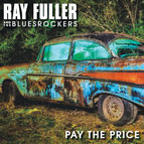 Ray
Fuller
Ray
Fuller
and the Houserockers
Pay The Price
Azuretone Records www.rayfuller.com
Ray Fuller and the Bluesrockers have been touring and putting out rocking
blues-based albums for decades now, the latest before “Pay The Price”
was 2016’s “Long Black Train.” Guitarist/singer/songwriter
Ray Fuller, who was once lauded by none other than Muddy Waters, is backed
on the entire album by his able and sturdy band, the Bluesrockers: Doc
Malone on harmonica, Manny Manuel on bass and drummer Tutu Jumper. The
album, produced by Sherri Fuller (Ray’s wife), was recorded by Joey
Gurwin at Oranjulio Studios in Columbus, Ohio. The cover photography features
a dilapidated ’57 Chevy, rusted and apparently abandoned in what
looks to be a swamp. Cool, but not sure what that means, I digress…
The album, with eight Ray Fuller originals and six cover songs, opens
with Fuller’s “Hoodoo Train.” The swampy rocker is a
travelogue describing the sights and musical sounds aboard a train heading
south along the Mississippi River from Memphis all the way down to Lake
Pontchartrain and New Orleans. The title cut, “Pay The Price,”
is a cautionary tale of paying the piper when one gambles and loses, especially
in the ways of love. “Pearline” is another Fuller original,
a straight-ahead Chuck Berry-styled rocker. “Mojo Hand” is
a Lightning Hopkins tune that features a tasty harp solo by Doc Malone,
as well as on the next track, “Alabama Train,” which is supported
by Fuller’s tremolo-drenched guitar. Throughout the album, Malone
plays a constant supportive role on the harp, always blowin’, but
never in the way of the vocals or guitar solos. “Bad Luck and Trouble”
offers a fresh take on the oft-used title and showcases some nice Elmore
James-style slide. “I Will Not Let You Go” is one of Chuck
Berry’s lesser known gems. Different from a lot of “The Architect
of Rock’n’Roll’s” classics, it revisits the VI
chord in addition to the standard I, IV, V we are all used to hearing.
The rhythm section of Manual and Jumper is solid throughout. The band
name is especially accurate as these guys hit hard and powerful: blues
music played with the dynamics of rock musicians. Although Fuller’s
reputation seems to rest on his excellent slide guitar playing, a lot
of the tunes here, like “Devil Woman,” show a distinctive
single-note style not unlike John Fogerty’s excursions on certain
CCR jams, like “Heard It Through The Grapevine.” It just goes
to show that Fuller and Fogerty are both drinking from the same well,
and it’s called The Blues. – Bob Monteleone
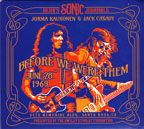 Jorma
Kaukonen & Jack Casady
Jorma
Kaukonen & Jack Casady
Before We Were Them
Owsley Stanley Foundation 2018
Recorded a half century ago, this live set played at a venue in Santa
Rosa, CA, in June 1969 was preserved by the late Owsley Stanley, renowned
LSD purveyor and master sound recorder and archivist. The principals:
guitarist-singer Kaukonen and bassist Casady, moonlighting from their
“day jobs” with the seminal psychedelic band Jefferson Airplane,
two months before they christened their partnership “Hot Tuna.”
That duo, abetted by various musicians and instruments, continues touring
to this day as Hot Tuna, decades after the demise of the Airplane. During
the ensuing years Kaukonen has established his legacy as one of the best
finger-picking guitarists, and a preservationist and promoter of the classic
acoustic blues that he reveres. Casady’s own legacy is safe as a
creative and innovative bass player.
Kaukonen and Casady began playing together as teenagers in their hometown
of Washington, DC, and their rapport is striking. For this particular
gig the duo was accompanied by sometime Airplane drummer Joey Covington.
“Before We Were Them” documents (with very good sound quality)
a night of music characterized by blistering psychedelia taken to extremes
of headspace and time-space. There are only seven tunes, but comprising
over an hour of music; the shortest is almost eight minutes long and the
longest, the instrumental “Through the Golden Gate,” clocks
in at almost fourteen. That track could be called “Through the Psychedelic
Door”; for those not in a chemically altered state of consciousness
while listening to it, and too young to have experienced the psychedelic
era personally, it’s a mini-introduction to that era. Although tempos
occasionally shift, the intensity doesn’t; Casady’s swirling
bass and Covington’s propulsive drumming provide the backdrop for
Kaukonen as he ventures from ecstasy to lyricism to lust, interspersed
with rock rhythms. (In my opinion, Kaukonen’s only rival as psychedelic
guitarist supreme was the late John Cipollina of Quicksilver Messenger
Service. If you aren’t familiar with Cipollina, check out “Who
Do You Love” and “Mona” on Quicksilver’s “Happy
Trails” album. I know no better psychedelic rock!)
There are two overt nods to the blues. The first is the opener, B.B. King’s
“Rock Me Baby,” with Kaukonen generally adhering to the twelve-bar
format but blasting off into various sonic excursions en route. That track
is followed by “Turnaround,” which begins at a leisurely pace
but picks up speed steadily, buttressed by the frenetic and astonishing
drum flourishes of Covington. Next up: the shortest, most recognizable,
and most melodic track, a rendition of “Star Track,” a song
composed by Kaukonen and present on the fourth Jefferson Airplane album,
“Crown of Creation,” which was released in summer 1968. On
it Jorma waxes more ethereal than fiery, while plying his somewhat reedy
vocalizing, which has never been his forte but is competent.
The other explicit nod to blues is a “cover” of “Come
Back Baby,” penned by the under-recognized Walter Davis. Kaukonen
sings toward the beginning, but it evolves, as do the succeeding two instrumentals,
into another display of Casady and Covington’s rhythmic mastery
ensconced behind Kaukonen’s electric guitar wizardry, the latter
balanced on the edge between self-indulgence and transcendence.
“Before We Were Them” affords a glimpse of Casady and Kaukonen’s
transitional period between the unabashed psychedelia of the Jefferson
Airplane and similar 1960s bands -think Quicksilver Messenger Service
and Country Joe and the Fish - and the enduring blues rock of Hot Tuna.—Steve
Daniels
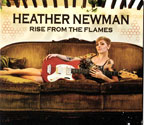 Heather
Newman
Heather
Newman
Rise from the Flames
Vizztone 2019
Her sophomore effort is as rousing as her first.
Omaha native Newman is now based in Kansas City, and has morphed from
acoustic guitarist to bass player while continuing to purvey her vocal
and songwriting talents. I had the pleasure of reviewing in these pages
her initial release, 2017’s “Burn Me Alive,” which featured
her basic trio: in addition to herself, Keith Ladd on guitar and Ryan
Flemmer (apparently AKA Ryan Matthew) on keyboards and percussion. On
this latest release Adam Watson has capably assumed the drum seat as the
group sashays through thirteen original tunes.
The nearly hour-long set begins with its longest track, “I’m
Coming for You,” introduced by some gritty Ladd chords over rock-steady
drumming; Matthew’s swirling organ emerges from the background for
a nice solo. Right away Newman’s powerful singing is manifest, distinguished
by the spectrum from growling rasp to sultry coaxing. On the ensuing track,
“Zakary,” saxophone by Michael Lefever and trumpet by Teddy
Krulewich add to the mid-tempo soul soup. Next up: “She Sure Looks
a Lot Like Me,” the shortest track of the set, my favorite, and
the most adherent to the twelve-bar blues format. The lyrics are clever,
the singing is insistent, and Ladd juices it with stinging guitar. “You
Mean to Tell Me” continues the mid-tempo vibe but augmented by atmospherically
ethereal organ courtesy of Matthe who switches effectively to piano on
the syncopated title tune and duets nicely with Heather.
Three slow numbers follow, and after the aptly named “Take It Slow”
the horns reappear on “Coming Home,” one of the tunes in which
Newman’s bass playing is most easily heard, particularly in its
interplay with Ladd. “What Goes Around” affords another example
of the polished melding of Matthew’s piano and his vocal harmonizing
with Newman. The skilled horns emerge once more on “Cheapshot”
before the set ends with the aptly titled “That’s All,”
Newman apparently abetted by her own dubbed backing vocal.
The cohesion of this combo and the quality of the songs are impressive,
and Newman provides further evidence of the passion, conviction, and potency
of her singing talent. “Rise from the Flames” bodes well for
Heather Newman and her band.—Steve Daniels
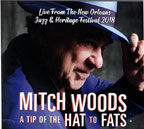 Mitch
Woods
Mitch
Woods
A Tip of the Hat
to Fats
Blind Pig 2019
Put on this album and prepare to par-tay!
Native New Yorker Mitch Woods has been a denizen of the San Francisco
Bay Area for almost fifty years, during which time he has plied his piano
prowess on multiple albums, played with a myriad of blues notables, and
established a recurrent presence on Legendary Rhythm & Blues Cruises
and at the New Orleans Jazz & Heritage Festival (“Jazz Fest”).
This live recording of Woods at the 2018 festival occurred about six months
after the demise of rhythm-and-blues and rock-and-roll icon Antoine “Fats”
Domino. Woods cites Fats as an influence, and accordingly fashioned his
set as a Fats tribute. Along the way, Dr. John (who died in June of this
year) and legendary New Orleans pianist Professor Longhair also receive
kudos from Woods.
For this gig, Woods assembled an All-Star New Orleans Rocket 88 combo
of veteran super-musicians. The spirited and soulful horn section is comprised
of Amadee Castenell, Brian Cayolle, and Roger Lewis, all of whom were
in Domino’s band. Bassist Cornell Williams played with piano maestro
Jon Cleary, a celebrated adopted NoLa son. Filling the drum seat is Terence
Higgins, erstwhile member of Houma, LA, resident Tab Benoit’s band.
The guitarist is John Fohl, long-time Dr. John bandmate. Their bona fides
are indisputable.
A joyful collaborator, Woods obviously relishes playing with fellow musicians
and always allows them well deserved solos and recognition. Mitch is an
effective singer, a skilled boogie-woogie keyboard man, and an amusing
raconteur. At his shows he invites audience participation and is one of
the most quick-witted responders to shouted comments and requests. All
those appealing traits are apparent as this set proceeds through nine
songs, with brief interludes of banter between them.
Although these tracks comprise a boogie-woogie mini-fest, two of the tunes
most associated with Fats are slow numbers. “Walking to New Orleans”
was composed by Domino and revered colleague and arranger Dave Bartholomew
(who died in June 2019); Woods’s nice vocal is burnished by soulful
horn support. Likewise, “Blue Monday,” penned by Bartholomew,
is distinguished by sequential saxophone solos by Cayolle and Lewis.
Of course, the crowd, and we, are treated to ample boogie boisterousness,
from the opening track, “Solid Gold Cadillac,” to “Mojo
Mambo,” both composed by Woods; the New Orleans staple “Crawfishin’
“; and the Jackie Brensten rock-and-roll precursor, “Rocket
88.” The set reaches perhaps its epitome with its longest track,
Hank Williams’s “Jambalaya.”
The liner notes include a photo of the crowd in the blues tent at Jazz
Fest standing and cheering, and the audible ovation at the end of the
CD attests to Mitch Woods’ ability to percolate and please.—Steve
Daniels
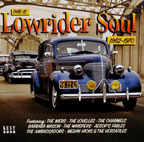 This
Is Lowrider Soul: 1962-1970
This
Is Lowrider Soul: 1962-1970
Various Artists
Kent CD www.acerecords.com
The Mexican, Central and South American immigrants, who migrated to various
locales in east Los Angeles in the fifties and sixties, have long had
a proclivity for soulful love ballads—aka “slow jams”—and
if you recall War’s 1975 single, “Low Rider,” that immortalized
the radically customized, batteries in the trunk, low-slung cars bouncing
around on city streets in southern California, this the music that was
on their blasting radios. The multi-media scene, with its deep roots in
California’s Chicano culture, has been continuously evolving
and expanding, recently even gaining a vibrant foothold in the U.K. The
laid-back sound also leans heavily toward the currently-popular U.K. Northern
Soul sound that, likewise, favors slow, sweetly-moody, late-night soul
sounds. Covering the years from 1962 through 1970, the music here
moves from the mellow, blue-eyed soul of Aesop’s Fables—with
their in-the-groove advisory “Take A Step”—to the doo-wop
flavored sound of both The Vows, on their pleading “I Wanna
Chance,” and the still-active Whispers with their gently swaying,
reflective ballad “As I Sit Here.” Further lowrider classics
offering plenty of that unique sound, instantly recognizable a la reggae,
rockabilly or blues, are provided by the likes of Brenton Wood (“Where
Were You”), William Bell (“Crying All By Myself”), Jimmy
Conwell (“Second Hand Happiness”), Barbara Mason (“Oh
How It Hurts”), the Endeavors (“Shattered Dreams”) and
Debbie Taylor, with her convincing “Never Gonna Let Him Know”
among a host of others—most of which are already quite well known
in Europe. An extremely well-curated, 24 track project that includes a
fact-jammed, image-laden 24 page booklet by lowrider aficionado Ruben
Molina.—Gary von Tersch
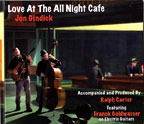 Jon
Gindick
Jon
Gindick
Love at the All Night Café
Old Chimney Records 2019
You may know Jon Gindick’s name if you like blues harmonica music,
particularly if you have tried to learn to play the harmonica. For four
decades now Gindick has been a major name in harmonica pedagogy, initially
through his widely perused instructional books and more recently via CDs,
online videos, and regularly scheduled “jam camps.” Also an
adept guitarist, Gindick was influenced by Bob Dylan’s use of the
two instruments, and later by a chance meeting with the great country
bluesman Reverend Gary Davis.
Not surprisingly, Gindick can really play that mouth harp! “Love
at the All Night Café” is only his second album, following
the release almost a decade ago of “When We Die We All Come Back
As Music.” Do the album titles give you a hint of his strengths?
Not only an accomplished musician, Gindick is a deft wordsmith whose humorous
and poignant song lyrics embellish his musical delivery.
This set finds Gindick collaborating with long-time colleague Ralph Carter,
who plays bass, keyboards, and percussion in addition to producing. Along
for the ride are Pete Gallagher on drums and backing vocals, and Franck
Goldwasser - also known as Paris Slim - on acoustic and electric guitar.
Individual musician song credits aren’t given, so it’s impossible
to know whether Gindick or Goldwasser is playing when acoustic guitar
is evident, but the latter handles the electric forays.
Gindick is the focus here, and deservedly so. The CD sound quality is
excellent and serves to emphasize the tonal purity of Gindick’s
harmonica playing. More partial to single notes than chords, he commands
the entire register of the instrument, replete with seemingly effortless
trills, bends, and syncopated stutters.
His singing is appealing as well: a supple tenor with good range and expressiveness.
There are multiple highlights in a set without “lowlights.”
“Feeling Her Gone,” for example, is a swinging mid-tempo track
introduced by a few bars of Goldwasser’s tasty guitar, and it’s
followed by the fine twelve-bar “Baby’s Got the Blues”
…by which time we gladly have them also. The title tune features
creative, cinematic lyrics rivaled in cleverness by several other tracks.
“Load Me Up Baby” begins in classic blues format but undergoes
several tempo variations. “Hand Holding Man” slows the tempo
and affords Carter a few bars of nifty, tinkly piano prominence.
The “message” of this album is summed up by the opening tune
(Gindick wrote all twelve of the set), “I Was Born to Wail.”
Namechecking harmonica greats Little Walter, Sonny Boy Williamson II,
Jimmy Reed, Big Walter Horton, Sonny Terry, and George “Harmonica”
Smith, Gindick cites their influence on him and his adoption of the instrument
as his own. He is a worthy addition to that pantheon of harmonica mavens,
and a creative songwriter as well.—Steve Daniels
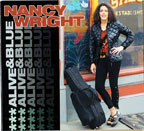 Nancy
Wright
Nancy
Wright
Alive & Blue
Direct Hit Records/VizzTone 2019
It is my contention that perhaps no musical instrument is as capable of
expressing such diverse emotions with such intensity as the saxophone.
Sensuality, soulfulness, spirit, spirituality, sadness…sax can deliver
them all, as exemplified by one its best current practitioners, Nancy
Wright.
Originally from the Midwest, Wright has called the San Francisco Bay Area
her home for about three decades. Her capability is emphasized by the
mind-boggling list of blues performers who have utilized her talent: Lonnie
Mack, B.B. King, Albert Collins, Katie Webster, Robert Cray, Bonnie Raitt,
Ike Turner, Stevie Ray Vaughan, Albert King, Maria Muldaur, Elvin Bishop,
John Lee Hooker….I could go on, but you get the message: top flight
talent seeks to play with top flight talent.
A Blues Music Award nominee for the last three years for Horn Player of
the Year, Wright has released several recent albums, including 2017’s
“Playdate!” which showcased her backed by a group of sterling
session musicians and a rotating cast of stellar guests: Joe Louis Walker,
Chris Cain, Tommy Castro….On “Alive & Well” she
is supported by her own band, comprised of Karl Sevareid on bass, Tony
Lufrano on piano and organ, Paul Revelli on drums, and Jeff Tamelier on
guitar. This group swings!
This set - over an hour-and-a-quarter long - was recorded live in December
2018 at The Saloon in San Francisco. Wish I could have been there; the
enthusiasm and appreciation of the crowd are apparent, and well warranted.
The ensemble deals out a dozen extended tunes, the shortest almost five
minutes long, giving the members time to percolate together and then levitate
in scintillating solos. Center of the festivities is Wright, of course,
with her tenor sax alternately jittering, jiving, wailing, moaning, and
crooning.
There are four instrumentals, beginning with track one, “Bugalu,”
goosed into life by bass and drums, joined by restrained organ, and then
enlivened by Wright’s spunky lead. Tamelier stays in the background
on this one but delivers a unique and slightly dissonant guitar solo on
the ensuing track; his leads and fills provide surprises throughout. The
pattern persists throughout the set: long songs, tight band cohesion,
great sax playing, sultry vocals by Wright.
Aside from five Wright original compositions, there are several notable
covers. “I Don’t Want No Man” is a distaff version of
“I Don’t Want No Woman,” made famous by Magic Sam on
his classic album “West Side Soul” from 1969. “Jo-Jo,”
another of the instrumentals, is credited to Wright but sure sounds like
“Work Song,” the title tune of the 1960 album by jazz cornetist
Nat Adderley and covered by many others, most notably the Paul Butterfield
Blues Band on its 1966 album “East-West.” “Keep Your
Hands Off Him,” similarly, sounds like “Got My Mojo Workin’“
with altered lyrics.
What we get then, and the live audience got, is emulation combined with
innovation and syncopation, leading to an ovation…and a deserved
one. If you need convincing, just listen to the longest track, an eight
minute cover of “Soul Serenade” that demonstrates the meshed
gears of this combo and the full strength and soul of Nancy Wright’s
saxophone mastery.—Steve Daniels
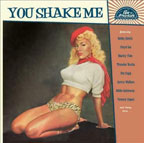
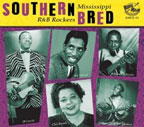
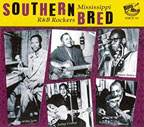
VARIOUS ARTISTS
You Shake Me
Pan American Records CD
Southern Bred/ Volume One—Mississippi R&B Rockers
Koko Mojo CD
Southern Bred/ Volume Two
Mississippi R&B Rockers
Koko Mojo CD
As far as I can tell from this side of the pond, Germany’s Rhythm
Bomb label complex is growing at leaps and bounds, not only adding labels
like Switzerland’s prolific rock ‘n’ rolling Pan-American
imprint to its distribution complex but continuing to issue their own
themed rhythm ‘n’ bluesy compilations on their Koko-Mojo imprint.
Pan-American’s 26-tracker highlights include a storming recall of
Gene Vincent’s classic “Be-Bop-A-Lula” (and I mean storming)
by Junior Shank and the Jesters, Presley sound-alike Pat Cups’ Sun-sounding
“I Guess It’s Meant That Way,” Sunny Wallace’s
descriptive “Black Cadillac,” Tex Neighbors with his “Rockin’
Beat,” Marvin Jackson and his Ozark Toppers with an exclamatory
“Gee Whiz, Miss Liz,” Lucky Planks with his invitational “Hey,
Hey Baby,” Louisiana’s T.K. Hulin and his Lonely Knights with
the jumping “Little Bitty Boy,” Ronnie Gill and the Pastel
Keys touting the teenage “Geraldine” and Chicano rocker Eddie
Quinteros with his advisory “Slow Down Sandy.” The pair of
Southern Bred discs both feature 28 tracks and focus on the panoply of
artists that recorded for, or were associated with, Lillian McMurray’s
fabled Trumpet label in Jackson, Mississippi, with the accent on the “jump
blues” sides. Volume One shines the spotlight on pianist Willie
Love and his mentor Sonny Boy Williamson, with Love (and various versions
of his Three Aces) working out on nine tracks—picks include “Feed
My Body To The Fishes,” “Nelson Street Blues,” “Take
It Easy Baby,” “Shout Brother Shout” and “Vanity
Dresser Boogie.” Love also accompanies his mentor and Elmore James
on 7 invigorating titles—“Stop Now Baby,” “Crazy
About You Baby,” “Do It If You Wanna,” “Pontiac
Blues” and “I Cross My Heart” among them. Ace compiler
Mark Armstrong also includes further Trumpet sides by the likes of Arthur
“Big Boy” Crudup (“Gonna Find My Baby”), Tiny
Kennedy (“Blues Disease”), Big Joe Williams (“She Left
Me A Mule”), Jerry McCain (“Stay Out Of Automobiles”)
and Luther Huff, with his “1951 Blues.” Volume Two serves
up more “jump blues” from the Trumpet label but ranges farther
afield, mixing in a range of other ‘Southern Born’ artists
such as Robert Johnson (“Preaching Blues”), Little Milton
(“Ooh! My Little Baby”), Bo Diddley (“All Together”),
Eddie Clearwater (“Hey Bernadine”), B.B. King (“B.B’s
Boogie”), Jimmy Reed (“Shame, Shame, Shame”) and Ike
Turner’s Kings Of Rhythm (“That’s All I Need”)
among others with post-Trumpet or leased sides (Trumpet closed down in
1956) by Sonny Boy Williamson, Elmore James, Sherman “Blues”
Johnson, Wally Mercer and Luther Huff. And good news!—three more
titles in this illuminating series are in the pipeline.—Gary von
Tersch
Book
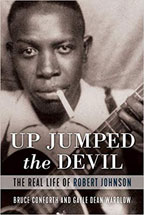 Up
Jumped The Devil: The Real Life Of Robert Johnson
Up
Jumped The Devil: The Real Life Of Robert Johnson
By Bruce Conforth & Gayle Dean Wardlow
Chicago Review Press
Ho hum, yet another book about the ill-fated, enigmatic Robert Johnson.
Yet this one’s way, way different, co-authored by a pair of dogged
researchers, Bruce Conforth and Gayle Dean Warlow, this compellingly definitive
biography fairly percolates with maps, deeds, birth and death certificates,
images, graphics, traveling companions, census reports and remarkably
astute deductive reasoning to scholarly document their seemingly definitive
account of Johnson’ birth and unfortunate early years, wide travels,
multiple tragedies, triumphs and heady contribution to blues and roots
music before his early, tragic death at only 27 on the night of August
13th, 1938 at Greenwood, Mississippi’s Three Forks plantation store/
juke joint. The authors also put to rest once and for all the matter hinted
at by the book’s title—the infamous bargain at the crossroads—mainly
through a relevant series of first-person interviews, insightful inferences
as well as listening to the aural evidence. The authors also have the
documented details on numerous stories about Johnson’s Memphis days,
his marriage and many love interests along with the circumstances relating
to his untimely death and other remarkable elements of a remarkable, if
brief, life story. Sometimes the truth is as good as the story. An in-depth
biography for the ages.—Gary von Tersch
Films
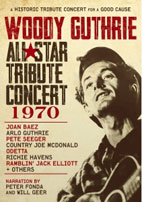 Woody
Guthrie: All Star Tribute Concert 1970
Woody
Guthrie: All Star Tribute Concert 1970
Various Artists
MVD VISUAL DVD (80 minutes)
www.MVDvisual.com
Held in the fabled Hollywood Bowl, this previously unreleased, star-studded
event was a fundraiser for the California Chapter of the Committee to
Combat Huntington’s Disease Foundation, as Woody succumbed to the
degenerative nerve illness in 1967. Featuring archival film-enhanced narration
by actors Will Geer and Peter Fonda, it musically celebrates the work
of the legendary folk singer and celebrated songwriter with inspired performances
by Woody’s son Arlo (“Oklahoma Hills” and “Do-Re-Mi”),
clear-voiced Joan Baez (with “Plane Wreck At Los Gatos (Deportee)“
as well as with linchpin Pete Seeger on “So Long It’s Been
Good To Know Yuh”) Country Joe McDonald (with a great “Pretty
Boy Floyd”) and Woody’s old traveling buddy, Ramblin’
Jack Elliott, who proffers the tragic tale of “The 1913 Massacre.”
All in their prime, as well as Odetta (with powerful versions of both
“John Hardy” and “Ramblin’ Around”), earnest-voiced
Richie Havens with the testimonial “Nine Hundred Miles” and
the two still sprightly ex-Weavers, Seeger and Earl Robinson, with “Roll
On Columbia.” Also noted is the opening ensemble number with a rousing
reappraisal of Woody’s “This Train Is Bound For Glory”
and a quartet (McDonald, Seeger, Elliott and Arlo) rendition of “Goin’
Down The Road Feeling Bad.” Also noted is the presence of Ry Cooder
in the chemistry-rich backup band. Extras include concert rehearsal footage
and audio interviews with both Arlo and Elliott. Long live Woody!—Gary
von Tersch
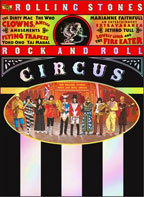 Rolling
Stones Rock & Roll Circus
Rolling
Stones Rock & Roll Circus
Abkco Films And Abkco Music And Records
Blu-Ray/DVD/2CD
Originally visualized as a BBC special to boost the band’s Beggars
Banquet album, this Fellini-esque project, filmed in a north London television
studio by cinematographer Tony Richmond, was abandoned in the wake of
Brian Jones’ ejection from the band and ensuing death—the
film wasn’t officially released for the next 28 years. This total
4K Dolby Vision and Dolby Atmos restoration and soundtrack is also on
vinyl for the first time ever and includes previously unheard tracks by
the legendary Lennon-Richards-Clapton-Mitchell Supergroup, The Dirty Mac.
Essayist David Dalton pretty much sums it up thusly: “ You are about
to be transported by a filmic time capsule to another age—swinging
London in the late sixties. Two days in December 1968 that, in many ways,
captured the spontaneity, aspirations and communal spirit of an entire
era—for a brief moment it seemed like rock ‘n’ roll
would inherit the earth.” Featuring inspired performances by Jethro
Tull, Marianne Faithfull, the Who, Taj Mahal and the fore-mentioned Dirty
Mac, the meat of the matter is the Stones material. In addition to acting
as gregarious on-screen hosts for an audience of fan club members, contest
winners and friends they perform six breathtaking versions of some of
classics live in front of the “circus” audience—“Jumpin’
Jack Flash,” “Parachute Woman,” “No Expectations,”
“You Can’t Always Get What You Want,” “Sympathy
For The Devil” and “Salt Of The Earth.” Also noted is
a one hour film commentary, titled Life Under The Big Top, that contains
reflections by Mick Jagger, Ian Anderson, Taj Mahal, Yoko Ono, Bill Wyman
and Keith Richards. In fact, I’ll give Mr. Richards the last word:
“It was an incredible shoot, I think, 36 hours or something. I remember
not remembering everything towards the end...but it was fun...we went
through two audiences...wore one out...it was great!”
— Gary von Tersch